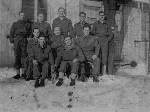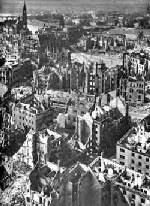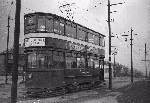Part 5 Germany Ten of us were sent to this work unit at a place called Niederwiese. We were lodged at an engineering factory. There were three wooden huts in the grounds, one of which was surrounded by wire. This was our hut and was to be our home till the end of the war. The other huts were occupied by Poles, French and Czechs. They were free to come and go as they pleased. Our Hut also included quarters for the Postern, our German guard. Our first job was to clear the rubble from a dismantled chimney. They had knocked it down because our bombers were using it as a marker on their bombing runs into Chemnitz. We had to collect all the bricks for reuse. Our next task was to build a water trench to the next village. Each day a civilian engineer would pace out a number of yards for each of us to dig. I was very fit at the time and would help one of the older members of our group when I’d finished my section. One of our group, Phil Measures, was a Jewish lad from London. His dog tag said he was Church of England, in case he was captured and of course we never talked about it. He could speak Yiddish, which is a Jewish language of Germanic origin, and he could also speak fluent German. Each day a civilian engineer would pace out a number of yards for each of us to dig. I was very fit at the time and would help one of the older members of our group when I’d finished my section. One of our group, Phil Measures, was a Jewish lad from London. His dog tag said he was Church of England, in case he was captured and of course we never talked about it. He could speak Yiddish, which is a Jewish language of Germanic origin, and he could also speak fluent German. Our regular postern was very good. His wife was billeted nearby. She would cook for us and also took photos of us, one of which I still have, of the ten of us and our dog Rastus. Some of the other posterns weren’t so pleasant. We were made to build an air raid shelter in a nearby forest for German factory workers. It meant crossing a railway line each day. On many occasions we saw cattle trains pass by, packed with civilians on their way to nearby death camps. In the winter of 1944/45 we saw fighter planes as well as bombers overhead, indicating that the front lines were getting closer. In February, for 3 days, British bombers by night, American bombers by day dropped their loads on Dresden. We were 15 miles away but the ground never stopped moving. Our work party was sent into Dresden 2 days after the bombing finished to help with the clearing up. I have never seen such absolute destruction before. The city was so badly flattened you couldn’t tell where the houses ended and the roads started. We had to clear away any bodies we found and dig out the roadways to get the local traffic flowing again. Most people travelled by horse and cart. When the locals realised that we were British they became very hostile, so much so that we had to be withdrawn back to our camp. We were 15 miles away but the ground never stopped moving. Our work party was sent into Dresden 2 days after the bombing finished to help with the clearing up. I have never seen such absolute destruction before. The city was so badly flattened you couldn’t tell where the houses ended and the roads started. We had to clear away any bodies we found and dig out the roadways to get the local traffic flowing again. Most people travelled by horse and cart. When the locals realised that we were British they became very hostile, so much so that we had to be withdrawn back to our camp. From Christmas onwards we had been able to hear heavy gunfire to both east and west. We were in the middle of two converging Allied armies, not knowing whether the Russians or the Americans would get here first. Then one morning German combat troops came running through our factory and our Postern took off after them. All went quiet. Two of us walked down the road from our factory and saw a jeep flying a red flag, coming towards us. They must have been used to seeing POWs because they said to us (in German) to carry on walking and we’d meet up with a troop of Russian soldiers, which we did. They gave us soup and coffee then we returned to our camp. The Russians told us we must go behind their lines for safety so off we went to a makeshift camp and waited for a few days. When we heard that the war had ended we decided to make our way back to the west. We acquired a truck from somewhere and set off for the American lines. Lots of people tried to get on the truck but we fended them off as best we could and finally ran into a column of American soldiers. Bizaarly, they were a special unit who all spoke German. They put us all in a camp, full of thousands of soldiers from all over the world. The Yanks had a big job, sorting out who was who. We had to prove we were British. When we were given the okay we were taken to Halle where we boarded a Dakota aircraft and were flown to Brussels. We were greeted by British Red Cross and were given baths and new uniforms. We were then given some money and allowed two nights leave out on the town in Brussels. Another Dakota then flew us on to an aerodrome somewhere south of London. Before being given leave we were questioned by Intelligence Officers regarding evidence on any war crimes we might have witnessed. Then a telegram was sent home and we were granted leave.  When I got off the tram on Kirkstall Road a young girl was waiting. ‘Are you Charlie?’ She said. ‘Yes, who are you?’ I replied. ‘I’m Eileen’ (my sister) she answered. She was about 10 years old. She was four when I’d last seen her. I was finally demobbed in March 1946. |